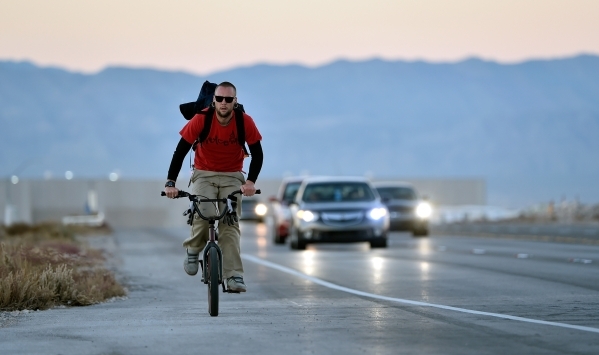There are laws, rules for sharing the road with bicyclists

There are reminders everywhere that encourage us to “share the road.”
But some motorists out there seem to be oblivious that bicyclists exist, or that they should share the road with them.
Meanwhile, there are bicyclists on our streets who feel they’re entitled to much more than just sharing.
Regardless of how you feel about people on bikes and whether you think they get more space than they deserve, laws mandate that people in cars give ground to those on bikes.
And it’s about to get more crowded on downtown Las Vegas streets with the arrival of the first public bike-share program by late summer. There’s a bike-share program in the 2,200-acre Cadence neighborhood of Henderson where 200 local residents share bikes. The Regional Transportation Commission of Southern Nevada is developing the downtown system.
Here are some of the rules of the road involving bicycles:
* Motorists are required to give bicyclists a 3-foot clearance when passing. That means even if a bicyclist is on the far-left side of a bike lane that already is 4 to 5 feet wide, people in cars must give 3 feet.
*When on multilane streets, a bicyclist is entitled to use one of those lanes. That means passing the cyclist in one of the other lanes. Standard vehicle passing laws exist when passing someone on a bicycle. In other words, a motorist must wait for a safe opportunity to pass.
*A bicyclist can use a travel lane when there are multiple lanes, but a motorist can’t use a bike lane for travel except in some circumstances involving crossing traffic, emergencies or parking a disabled vehicle.
*Bicyclists must follow the same rules as motorists for driving at night, specifically, a white headlight at the front and red reflectors on the back and on the sides. A rear tail light does not eliminate the need for a reflector. The light must be on up to a half hour before sunrise and a half hour after sunset.
*Bicyclists can ride on the sidewalk. They’re encouraged to go slowly around pedestrians and to dismount and walk when crossing streets in crosswalks.
*Bicyclists should ride in the direction of traffic. One of the key guides to bicyclists: Be predictable.
*Bicyclists are required to use hand signals for left and right turns and for slowing down.
A Warrior reader recently inquired about whether bicyclists are required to be licensed and, if not, how they contribute to paying for the maintenance of those nice green pathways that serve as bicycle lanes in downtown Las Vegas.
Jace Radke, a Las Vegas spokesman, said there are no licensing requirements.
“The city has been named a ‘Bike Friendly City,’ and I can tell you that the level of road wear and tear is significantly different for a car and a bicycle,” Radke said.
Although fuel taxes pay for roads and highways in Southern Nevada, there are no special provisions for bicyclists to pay into the system.
“But many people who have bikes also have cars,” said Ron Floth, bicycle outreach coordinator for the Regional Transportation Commission.
Some sales tax revenue is used for roads, so bicyclists contribute every time they buy a bike, helmet or replace a bike chain. Or buy lunch.
Floth added that when registering for a vehicle license, car owners have the option of paying an additional $2 into the “complete streets fund,” which is dedicated to the concept of better landscaped, narrower roads with lower speed limits, bike lanes, wider sidewalks and improved crosswalks.
And soon, we’ll see up to at least 180 more bikes cruising downtown streets.
The Regional Transportation Commission board approved the new bike-sharing program last month and is seeking community comments on where the 18 bike docking stations will be located.
Floth said it’s something Waterloo, Wisconsin-based BCycle has had experience doing in the 40 cities it has set up bike-sharing.
For those unfamiliar with how a bike-sharing system works, a program participant buys a membership — the price hasn’t been finalized yet, but it’ll probably be around $60 to $85 a year — to have access to one of the dozens of sturdy Trek Bicycles across downtown. BCycle is expected to offer daily and multiday memberships, too.
A customer gets a key fob or card that will release a bike from a docking station and then has it for 30 minutes before it has to be parked in a docking station. Longer usage incurs a fee that would be charged to an on-file credit card.
Floth said the RTC is picking the bike-riding public’s brains for the best locations for stations. The public can comment online through March 31 at the commission’s website.
The stations are easy to move, so if the right spots aren’t selected on the first try, it’s just a three-hour job to move one.
Bicycles in the program will be confined to a 1½-square-mile area bordered by Interstate 15 to the west, U.S. Highway 95 to the north, Bruce Street to the east and Charleston Boulevard to the south. The southern boundary juts farther south from Charleston on Las Vegas Boulevard and Main Street to the Stratosphere area.
Some prospective users of the program are disappointed that bikes can’t be taken farther south on the Strip. Floth said once the system has been road-tested, beginning at the end of summer, there may be some opportunities to expand.
But Floth is a little skeptical about bike traffic mixing with cars on Las Vegas Boulevard.
“When you drive or bike the Strip, you’d always be looking at the bright lights and the casinos,” Floth said.
That’s a little dicey, even if people on bikes legally have the right to use at least one of those Las Vegas Boulevard lanes.
Questions and comments should be sent to roadwarrior@reviewjournal.com. Please include your phone number. Follow the Road Warrior on Twitter @RJroadwarrior